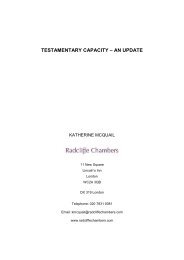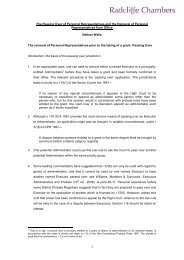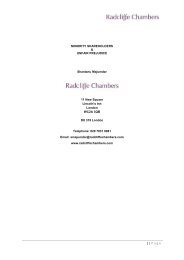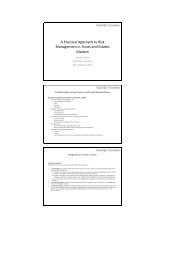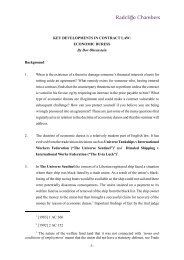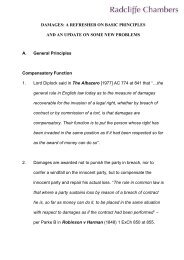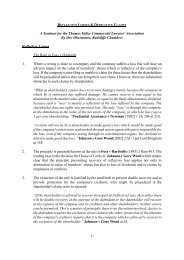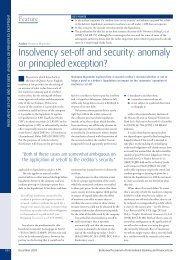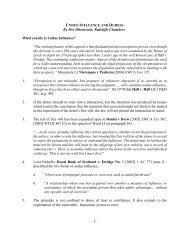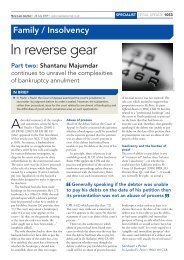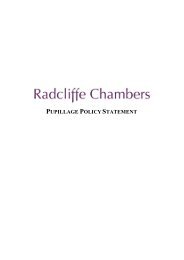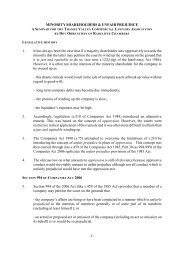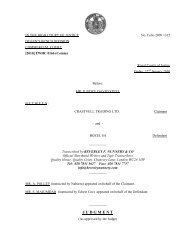Create successful ePaper yourself
Turn your PDF publications into a flip-book with our unique Google optimized e-Paper software.
TRUSTS AND EQUITABLE RELIEFIn the Gwembe Valley case theclaim against the defendant directorwas based upon his having madeunauthorised profits rather thanthat he had disposed of, or received,company property in breach of trust.For this reason the Court of Appealheld that this gave rise to a personalliability to account within (or akin to)a Class 2 trust. On the face of it theclaim therefore fell within s21(3) andwas therefore subject to a six-yearlimitation period. However, the judgehad found that the defendant had acteddishonestly and the Court of Appealheld that this brought the case withins21(1)(a) (fraud/fraudulent breach oftrust) so that no statutory limitationperiod applied.The court summarised itsconclusions on limitation as follows:Fiduciary duties and limitation– summaryLaches and acquiescenceIn any event, even where nostatutory limitation period appliesa claim falling under s21 may bedefeated by the equitable defencesof laches and acquiescence. It hasbeen said that:... it is important to note the differentsenses in which the word ‘laches’ isused. Sometimes it is used as asynonym for ‘delay’... Sometimes it isused to describe the lapse of a sufficientperiod of time to draw the inferencethat the plaintiff had previouslyapproved of the status quo which, by(a) the action is based upon the fraudof the defendant; or(b) any fact relevant to the plaintiff’sright of action has been deliberatelyconcealed from him by thedefendant; or(c) the action is for relief fromthe consequences of amistake;the period of limitation shall notbegin to run until the plaintiff hasdiscovered the fraud, concealmentor mistake (as the case may be) orEven where no statutory limitation period appliesa claim falling under s21 may be defeated by theequitable defences of laches and acquiescence.111. In the light of those cases, in ourview, it is possible to simplify thecourt’s task when consideringthe application of the 1980 Actto claims against fiduciaries. Thestarting assumption should be thata six-year limitation period willapply – under one or other provisionof the Act, applied directly or byanalogy – unless it is specificallyexcluded by the Act or establishedcase-law. Personal claims againstfiduciaries will normally be subjectto limits by analogy with claims intort or contract (1980 Act ss 2, 5;see Seguros)... By contrast, claimsfor breach of fiduciary duty, in thespecial sense explained in Mothew,will normally be covered by s 21. Thesix-year time limit under s 21(3), willapply, directly or by analogy, unlessexcluded by s 21(1)(a) (fraud) or (b)(class 1 trust).The lingering question iswhether this is quite consistent. Atparas 90-1, Mummery LJ had saidthat s21 does not apply to Class 2trusts/fiduciary duties. By this hewould seem to have meant s21(1)but, even so, if that is correct thenthe finding that the defendant was aClass 2 trustee would therefore excludehim from 21(1)(a) since dishonestyis, on this view, an additional notalternative requirement for itsapplication.his suit, he wishes to disturb... Moreoften, it is used not only in the secondsense just mentioned but also tocomprehend that degree of delaywhich when coupled with prejudiceto the defendant or third parties, willoperate as a defence in equity. (See<strong>Me</strong>agher, Gummow and Lehane’s Equity,Doctrines and Remedies, 4th edn (2002)at para 36-50.)P&O Nedlloyd referred to thispassage and expressed the view that,despite the evident lack of consistencyin the use of the laches, delay is anessential feature in the relevantdecided cases. It should also benoted that in many of these decisionslaches has been held to bar the claimin question after the passage of aperiod of time that is significantlyless than the length of most statutorylimitation periods but the existenceand extent of any prejudice either tothe defendant or third parties is acrucial factor.Fraud, deliberateconcealment and mistakeFinally, for the sake of completenessit should be noted that even wherea statutory limitation period wouldotherwise apply there are threesituations where it will not. Section 32of the Limitation Act providesthat where:could with reasonable diligence havediscovered it.Fraud has to be an essentialingredient of the claim for s32(1)(a)to apply. Deliberate concealmentunder s32(1)(b) includes ‘deliberatecommission of a breach of duty incircumstances in which it is unlikelyto be discovered for some time’(see s32(2)) and mistake unders32(1)(c) includes mistakes of lawas well as fact. ■Bristol and WestBuilding Society v Mothew[1998] Ch 1Cia de Seguros Imperiov Heath (REBX) Ltd[2001] 1 WLR 112Coulthard v Disco Mix Club Ltd[1999] 2 All ER 457Dubai Aluminium Co Ltd v Salaam[2003] 2 AC 366Gwembe Valley DevelopmentCompany Ltd & anor v Koshy & ors[2003] EWCA Civ 1048,[2004] 1 BCLC 131JJ Harrison v. Harrison[2002] BCLC 162Paragon Finance plc vDB Thakerar & Co[1999] 1 All ER 400P&O Nedlloyd BV v Arab<strong>Me</strong>tals Co (The UB Tiger)[2007] 2 All ER (Comm) 401September/October 2010The Commercial Litigation Journal 21CLJ33 p18-21 Majumdar.indd 21 30/09/2010 17:25:53



